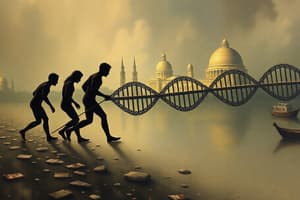Podcast
Questions and Answers
What concept describes the ability of organisms to maintain structure and regulate their internal environment?
What concept describes the ability of organisms to maintain structure and regulate their internal environment?
- Ecosystem dynamics
- Biodiversity
- Homeostasis (correct)
- Evolutionary biology
Which of the following best describes the three-domain system of classification?
Which of the following best describes the three-domain system of classification?
- It includes two prokaryotic domains and one eukaryotic domain. (correct)
- It divides organisms into two kingdoms.
- It is solely based on organism behavior.
- It is based on physical characteristics of organisms.
What are the two primary methods used in scientific inquiry?
What are the two primary methods used in scientific inquiry?
- Discovery science and hypothesis-based science (correct)
- Qualitative and quantitative research methods
- Observational and experimental methods
- Analytical and empirical science
In hypothesis-based science, what does the term 'hypothetico-deductive' refer to?
In hypothesis-based science, what does the term 'hypothetico-deductive' refer to?
What is a theory in the context of scientific inquiry?
What is a theory in the context of scientific inquiry?
What is the significance of variability within a species in terms of evolution?
What is the significance of variability within a species in terms of evolution?
Which of the following is the basic unit of structure and function in life?
Which of the following is the basic unit of structure and function in life?
What process is established by the transmission of DNA from parents to offspring?
What process is established by the transmission of DNA from parents to offspring?
What are emergent properties in biological organization?
What are emergent properties in biological organization?
What is the highest level of biological organization mentioned?
What is the highest level of biological organization mentioned?
How are structure and function related in biological systems?
How are structure and function related in biological systems?
Why is energy important for biological systems?
Why is energy important for biological systems?
What type of cells lack organelles?
What type of cells lack organelles?
Flashcards are hidden until you start studying
Study Notes
Properties of Life
- Approximately 8.7 million species are currently believed to inhabit Earth, sharing several common properties.
Evolutionary Adaptation
- Evolution is a fundamental concept in biology; organisms evolve over time.
- Within species, variability exists (e.g., height variation), influencing survival traits.
- Favorable genes tend to persist within populations, driving genetic change and evolution.
Hierarchy of Biological Organization
- Biological structures are organized into levels, each building upon the previous:
- Atoms → Molecules → Macromolecules → Organelles (absent in prokaryotes) → Cells → Tissues (not in all eukaryotes) → Organs (not in all eukaryotes) → Organisms → Populations → Communities → Ecosystems → Biosphere.
Emergent Properties
- Each organizational level exhibits emergent properties, where complex systems arise from simpler levels.
Structure and Function
- Cells serve as the fundamental units of structure and function in living organisms, including prokaryotic and eukaryotic cells.
Genetic Information
- DNA encodes hereditary information and directs the growth and development of multicellular organisms.
- Genetic traits are inherited through DNA transmission from parents to offspring, integral to the reproductive process.
Material and Energy Acquisition
- Organisms acquire materials and energy, essential for sustaining life.
- All biological systems are considered thermodynamically open systems that interact with their environment.
Homeostasis
- Organisms maintain internal balance and regulate their environment through mechanisms like negative feedback and positive feedback.
Interactions in Ecosystems
- Organisms engage with one another and their environment, forming the foundation of ecosystems, demonstrating unity and diversity.
Diversity of Life
- Organisms are categorized into groups to facilitate study. The three-domain system classifies life based on DNA characteristics:
- Bacteria and Archaea (prokaryotes).
- Eukarya (eukaryotes) encompasses four kingdoms: Protista, Plantae, Fungi, and Animalia.
Scientific Methods
- Science often employs two methodologies:
- Discovery Science focuses on the factual aspects (where, what, when).
- Hypothesis-Based Science concerns mechanisms (how, why).
- Data used in scientific inquiry can be quantitative or qualitative.
- Both methodologies adhere to principles such as:
- Natural causality: All events have natural causes.
Hypothetico-Deductive Process
- Hypothesis-based science employs a systematic approach, often called the scientific method:
- Begin with observations.
- Formulate a hypothesis.
- Perform experiments to test the hypothesis.
- A theory in science is an extensive explanation based on numerous observations and experimental results.
Studying That Suits You
Use AI to generate personalized quizzes and flashcards to suit your learning preferences.



